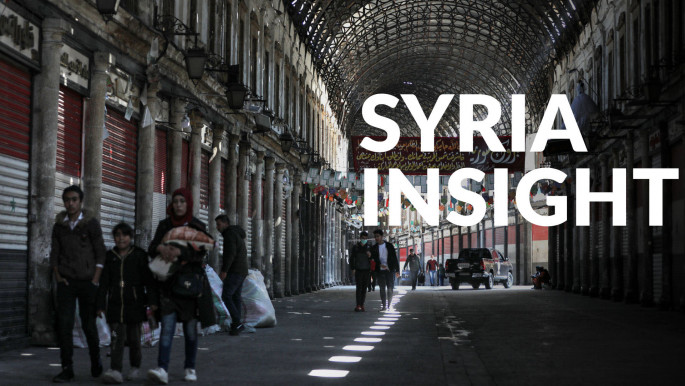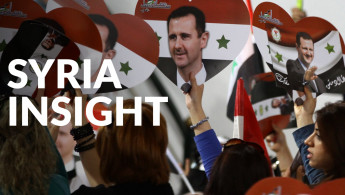Syria Insight: Assad begins his re-election campaign
Several compliant candidates have been approved by authorities for the 26 May presidential election - which has already been rejected by the US and Europe - in an exercise seen as attempting to add legitimacy to the dictator's rule.
Syria's last presidential election in 2014 marked a departure from the usual referendum process that usually rubber-stamped Assad's new terms as president.
For the first time in decades, voters were given ballot papers with other names besides Assad's, although neither candidate - businessman Hassan Al-Nouri and veteran politician Maher Hajjar - were seen as credible or legitimate.
Although Syrians could technically tick another box on their ballot papers, given the suffocating repression in Syria few felt more empowered to choose their leader.
New election, no change
Unsurprisingly, Assad took nearly 90 percent of the vote with celebrations held in several cities, reflecting not only the gusto of regime loyalists but also the compulsion of ordinary Syrians to take part in the charade.
The regime has consolidated more opposition areas under its rule since 2014, but an unprecedented economic crisis has hit all sectors of Syrian society and might dampen enthusiasm for the vote, even among the regime's traditional support base.
 |
Syrians will vote in an election that will see Bashar Al-Assad extend his two-decade rule over Syria for another term |  |
The regime will likely rely on its usual method of bribery and coercion to ensure Syrians come out in droves to "vote" for Assad, said Suhail al-Ghazi, non-resident fellow at The Tahrir Institute and researcher at Verify-Sy.
"They will bring state employees with buses and the militias will pay or give food baskets to citizens who vote so the local militia leaders can show their loyalty to Assad," he told The New Arab.
 |
|
| Syria Insight: Bread queues and hunger in Assad's Syria |
This year's election includes politicians Abdullah Abdullah and Mahmoud Marei.
The candidates running with Assad will see future benefits for their role in the farce, even if they officially leave as "losers" in the election.
"All candidates want to get fame and hope they may become an MP one day. It's also an opportunity to gain more support from the Syrian intelligence services," al-Ghazi said.
Amid the poverty and insecurity that has gripped much of Syria over the past seven years, the regime will likely use the election to promote an optimistic vision of the future, with possible investment from China and rekindled relations with regional states.
"The worsening economy is what's different [this election] and the regime wants to show that the election will mean a better relationship with other countries now that the 'conspiracy has been defeated' and will show how other countries like the UAE or China will be involved in aid and the economy," he said.
 |
The regime will likely rely on its usual method of bribery and coercion to ensure Syrians come out in droves to 'vote' for Assad |  |
Russian media
Bente Scheller, head of the Middle East and North Africa Department, Heinrich Boll Foundation Berlin, said the presidential election will have little impact on relations with Arab or European countries. For the regime's key international ally, Russia, the stakes are little higher.
"For Russia, legalistic issues might be even more important on the international level for the regime: its engagement in Syria is not meant to bring peace and stability in a way acceptable to Syrians as much as it is to convey the message to the international community," Scheller told The New Arab.
Russian government-linked media outlets have started promoting the election and will likely use the manufactured "success" of the process to justify Moscow's bloody intervention in the Syria war.
"If there was doubt about his legitimacy the Russia narrative of having been invited to support the legitimate power in Syria would fall apart," said Scheller, referring to Moscow's intervention in Syria.
"They have been floating the idea that Assad is not the only candidate and that his popularity has decreased was the topic of a number of nebulous 'surveys' Russian media publish occasionally."
 |
|
| Syria Insight: Fears for Syrian refugees in Denmark after government classifies Damascus as 'safe area' |
For the Syrian regime, the electoral process allows it to confer legitimacy on Assad's rule to domestic and international audiences, despite the obvious flaws in this argument.
"The purpose of presidential - or other - elections in Syria is to underline a point the regime is always keen on: portraying it as a democracy, as a place where people have a say while of course any participatory mechanism is monitored and hollowed out," Scheller added.
"Tyrannies don't like to be perceived as such, and thus, they love to highlight events which emulate democratic, inclusive appearance. In a context in which more Syrian citizens than ever are excluded from participating passively as candidates but also actively as voters this can't be taken seriously."
Constitution talks
The decision to go ahead with the election marks a major blow for UN efforts to establish a new constitution, with the last round of talks being effectively boycotted by regime delegates despite Russian pressure on Assad to fall in-line with the process.
Dima Moussa, an opposition member of the Small Body of the Syrian Constitution Committee, said the decision to push ahead with the election is another sign that the regime is not serious about peace.
 |
For the Syrian regime, the electoral process allows it to confer legitimacy on Assad's rule to domestic and international audiences, despite the obvious flaws in this argument |  |
"I think the inability of the Constitutional Committee to produce any results thus far is the result of the same behaviour that had previously resulted in the failure of the Geneva talks to produce any results and to any tangible or meaningful progress in the political process," Moussa told The New Arab.
"That all lies with the regime not engaging seriously or positively in any aspect of the political process. Going ahead with the presidential election is just one of the many indicators of this behaviour."
Last year's parliamentary vote was seen as another snub of the constitution talks, which resulted in regime loyalists and warlords dominating the national assembly. Despite this, Moussa said the opposition will continue to insist on finding a peaceful solution to ending the war that will lead to free and fair elections in Syria.
"My personal view of the whole [election] issue is to disregard it, not give it too much attention, and focus on continuing to advocate and push for a comprehensive political solution through the full implementation of UNSC Resolution 2254," the opposition politician said.
 |
|
| Read more: In its battle for influence, Russia's soft power strategy seeks to reshape Syria's future |
"In the end, these elections are not ones in which all Syrians will participate, nor are they commensurate with or part of the political process."
There are signs that other countries are giving more credence to the election than the previous presidential vote, including the regime's new friends in the region.
The UAE barred Syrians from participating in the 2014 election, which the Syrian foreign ministry described as being part of a "plot".
This year, the Syrian embassy in Abu Dhabi has announced that nationals with valid exit visas will be able to vote in the election - a caveat that appears designed to exclude a large section of the Syrian diaspora who left via border crossings not controlled by the government.
Many Syrians still felt compelled to vote in 2014 due to fears it could have consequences on obtaining new passports or paperwork from regime missions abroad.
Ruslan Trad, co-founder of the journal De Re Militari and co-author of Russian Invisible Armies, said there appears to be a more concerted effort among the Syrian diaspora to boycott the poll.
"The Arab community stigmatised those who participated in the last elections as Assad supporters, even if they weren't, so this time many more people will not participate," Trad told The New Arab. "In the past, regime embassies used these visits to pressure people and so many Syrians are also afraid of visiting these missions to vote."
Paul McLoughlin is a news editor at The New Arab.
Follow him on Twitter: @PaullMcLoughlin



